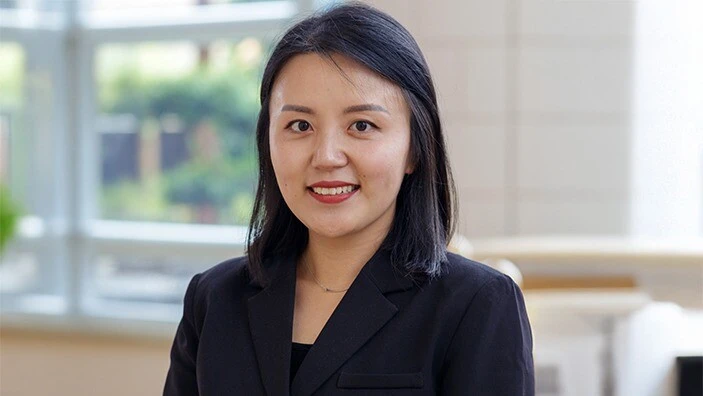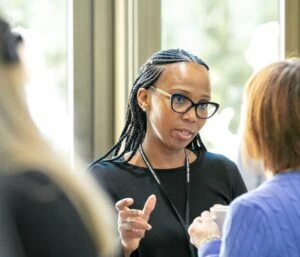Integrating Risk into Strategic Decision-Making
An executive education programme for senior leaders wanting to embed risk into strategic planning and improve organisational decision-making.
Upcoming programmes
Format:
Dates:
Duration:
Fees:
Face-to-face
17-19 Feb 2026
3 days
£4,800 + VAT
Face-to-face
24-26 Jun 2026
3 days
£4,800 + VAT
Upcoming programmes
Format:
Face-to-face
Dates:
17-19 Feb 2026
Duration:
3 days
Fees:
£4,800 + VAT
Format:
Face-to-face
Dates:
24-26 Jun 2026
Duration:
3 days
Fees:
£4,800 + VAT
Overview
Risk appetite. Culture. Strategy. Harness risk for better decision-making and learn to manage the interaction between strategy and the broader environment.
In times of economic volatility, regulatory change and digital disruption, risk is a critical element in strategic decision-making. The Integrating Risk into Strategic Decision-Making programme will help you successfully embed risk into your strategic thinking. Which strategic risks are critical to avoid? Which are essential to take? Gain the mindset and frameworks to integrate risk into your planning, improving your organisational decision making and your ability to thrive in the face of threats and opportunities.
Benefits and career impact
Reset your ability to perceive, mitigate and take advantage of risk and create strategic impact in your organisation.
- Learn strategies to manage against the unforeseen.
- Enhance your ability to identify risks early enough to respond.
- Recognise and overcome decision-making bias in yourself.
- Collaborate with leading faculty from the University of Cambridge.
- Become part of an international and ambitious peer support network.
- Receive a digital certificate of completion by Cambridge Judge Business School Executive Education.
- Configure your organisation to be more responsive and resilient to change.
- Overcome embedded organisational decision-making bias.
- Enhance your organisation’s competitive advantage.
Hello, I’m Danny Ralph, Professor of Operations Research at Cambridge Judge Business School and Academic Director of the Cambridge Centre for Risk Studies. Why am I here? Because the Risk Centre has been working with managers since 2009 to handle threats and opportunities that are systemic. This is about recognising the impacts that the real world has on you and your ecosystem.
Hello, my name is Kishore Sengupta. I’m a Professor in Operations at Cambridge Judge Business School, the University of Cambridge. My current research, teaching, and other activities are focused on managing complex projects, complexity in organisations, and the future of work. I’ve been a faculty member at Cambridge Judge Business School for the past 9 years. Before coming here, I was on the faculty at INSEAD in France and Singapore and in schools in the United States and Hong Kong.
In my research and teaching, I work closely with organisations in different sectors, especially in technology and services. Decisions made at all levels of an organisation are inevitably about risk. Every time you launch a new product or enter a new market, the potential rewards are significant, as are the risks. Consider this along with the fact that business environments have become more turbulent and uncertain.
What it means is that managers need to find a way to consider risks in their decisions. They need to be better prepared to anticipate and address uncertainty through a combination of proactive and reactive decisions. That’s what the programme is about. We offer an approach for participants to grapple with these issues and come up with solutions that are effective in the context of their own professional situations.
What does the programme offer?
So this programme offers internally focused and externally directed frameworks for asking what matters and on what timescale, and then how to prioritise your efforts today that go beyond your job description. In terms of strategy, we offer scenario planning. In brief, this is how to make horizon scanning actionable. We also offer 2 organisational frameworks, one for planning and integrating across the enterprise, the other for understanding internal dynamics, mapping complexity of interactions within your firm.
We also include a look at individual behaviours, which the popular press likes to call biases. But we’d like to do this without prejudice. Let’s understand how your experience can be made more useful than pure gut feelings.
Looking at risk from 4 different angles
We cover the topic of risk from 4 angles. The first is that of risks in the here and now, how our decisions and behaviours create risks, and what we can do about that. We examine this from the lenses of biases and heuristics. The second angle is about how risks affect the organisation and how to anticipate them. We look at techniques in enterprise risk management and organisation structure.
The third angle is about the longer time horizon. This is the domain of scenarios and how they are connected with the organisation’s strategy. And the fourth angle is about risks that arise from connections. We consider this from the perspectives of complexity and systemic risk.
Who should attend the programme?
In terms of who should attend the programme, well, this is for senior managers, people whose responsibilities go much wider than their formal expertise and for whom wisdom is not knowledge but constructive engagement. We meet business owners, strategy execs, chief risk officers, product managers, investors, and so on. Our sectors are also very broad– industry, energy, banking, other financial services, technology, food and beverage, retail, etc. The programme is useful because senior managers across the board are having to make more active, indeed, more proactive decisions without necessarily having the appropriate corporate ethos or structures in place. Senior managers need to invent it here.
The content is based on cutting-edge insights derived from research in different areas. The pedagogies are a mix of role plays, exercises, cases, and applications to the participant’s own situations. In terms of takeaways, participants can expect clear frameworks that are derived from research and are actionable in their own contexts.
Let me close with a word about Cambridge. It’s a beautiful city. Cambridge Judge Business School is the perfect setting for taking a strategic look at yourself and your organisation and preparing you for the next stages of your journey. Come join us.
Risk has often been seen as a technical discipline; rather removed from the “real” business of what organisations do. Equally, although uncertainty has always been a key aspect of any organisation’s existence, it has usually been assumed away as too hard to think about or too nebulous to consider. If we have learned anything from the last few years, we should have learned that these perspectives cannot be sustained. Indeed any organisation that continues to think this way is probably headed for a rude awakening. That is not to say that addressing these issues is easy, but it is now undeniably important. I am endlessly fascinated by the conversations we provoke on this programme. Serious issues raised by serious people and tackled with real commitment. It is an absorbing and valuable experience!
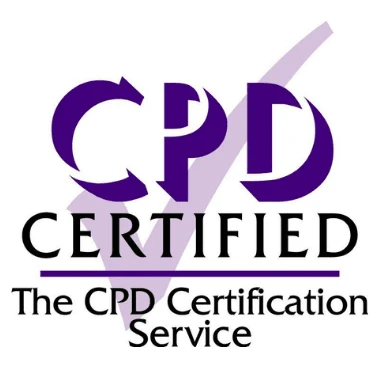
This programme is certified by the CPD Certification Service. It may be applicable to individuals who are members of, or are associated with, UK-based professional bodies.
Being at Cambridge Judge Business School gave me an opportunity to think and come up with new ideas and better solution.
Programme content
Gain a thorough grasp of the risk-informed components of decision-making.
Module 1: Heuristics and managing behaviour
- Surface unconscious modes of thinking in yourself and others.
- Understand the use of heuristics in decision-making.
- Develop a heuristic for managing risk.
Module 2: Risk to the enterprise
- Map the risks that you create on the road to generating value.
- Explore the aspects of your organisation that could benefit from an enterprise view of risk rather than an individual or functional view.
- Draw on management structures that support holistic thinking about organisations.
Module 3: Scenario generation
- Understand the need for scenario thinking.
- Identify drivers of change in the wider environment, and their relevance to your organisation.
- Build scenarios to avoid the prediction trap of planning for one future.
Module 4: Scenario assessment: connecting futures with strategy
- Assess the likelihood of a given scenario and your organisation’s level of preparedness.
- Identify and assess key success factors for your organisation.
- Identify activities and initiatives today to address the trends of tomorrow.
Module 5: Making sense of complexity
- Discover how complexity manifests within your organisation.
- Reflect upon how you react to complexity and challenge.
Module 6: Systemic effects and contagion
- Internalise a fact: systemic events, though unpredictable will hit sooner or later.
- Map the connected elements of your wider business environment.
- Explore the process of stress testing your organisation for resilience.
How you learn
Access the same quality of interactive and collaborative learning in the environment of your choice.
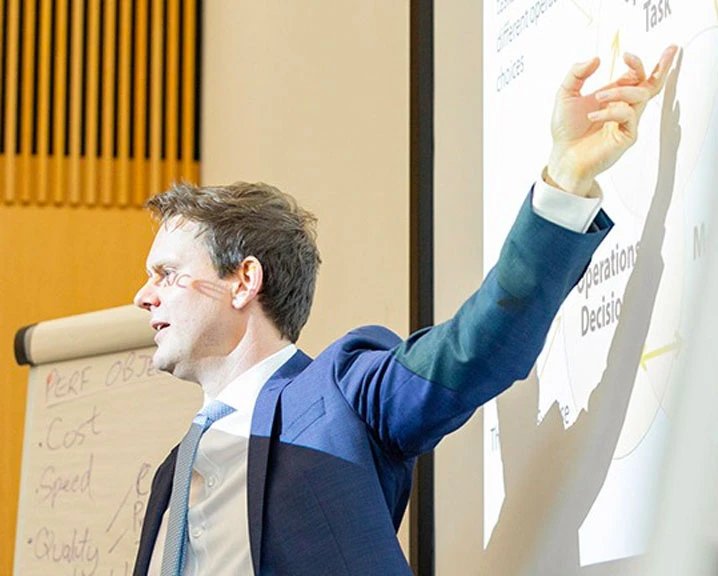
Face-to-face
Take time away from home and office and enjoy the traditional, immersive classroom learning experience in the historic city of Cambridge. Benefit from high level of interaction with our faculty and your peers and fully focus on your learning objectives, networking, and experience exchange. Join ‘Cambridge Union’-style debates, learn from guest speakers, and explore case studies of real-life organisations facing different risk challenges. As part of this programme, you will receive personal feedback to help you embed future thinking into your activities today.
Who attends
Take your thinking on risk and resilience to a more strategic level. This programme is for you if:
- you are a senior leader responsible for setting and implementing strategic direction
- you are a director or senior leader responsible for organisational change
- you are responsible for risk, resilience, business continuity, or crisis management and want to take your thinking on resilience to a more strategic level
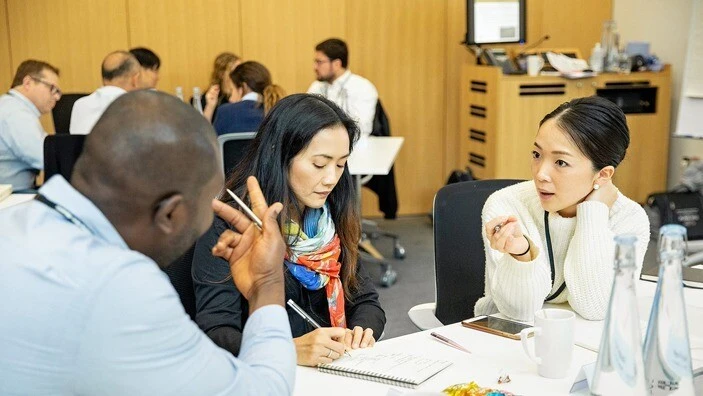
Thank you all for such a splendid course. I thoroughly enjoyed it. It once again challenged my thinking, offered that unique space for reflection and has galvanised me to action a number of points raised during the 3 days. The conversations during the breaks were incredibly helpful for us to confirm and agree how we might implement certain things once back in the office.
Faculty and speakers
Learn from our world-class faculty who bring fresh insights from their leading-edge research into all our Executive Education programmes. The Academic Programme Director (APD) for the Integrating Risk into Strategic Decision-Making programme is Professor Kishore Sengupta.
PhD (Case Western University)
Academic Director of the Centre for Risk Studies (CRS)
PhD (University of Wisconsin)
Why Cambridge Judge Business School?
Related programmes
The Integrating Risk into Strategic Decision-Making programme belongs to our Strategy-topic executive education programmes. Here is a selection of related programmes:
Strategic Management: Creating and Sustaining Competitive Advantage
Enhance your strategic capabilities and understand how to position your organisation to maintain competitive advantage. This programme introduces the fundamentals of strategic thinking, enabling you to identify and act on new opportunities for growth.
Digital Disruption: Digital Transformation Strategies
Understand disruption and how to deal with it. Build the game-changing business models that will help your organisation to compete, to grow, and most importantly, to disrupt others.
Strategic Thinking for the CXO
Formulate, evaluate and execute effective strategies for creating and maintaining competitive advantage, even in the face of uncertainty.
Speak to a programme advisor
If you have any questions or would like to discuss how this programme could benefit you or your organisation, please get in touch with the programme advisor.
